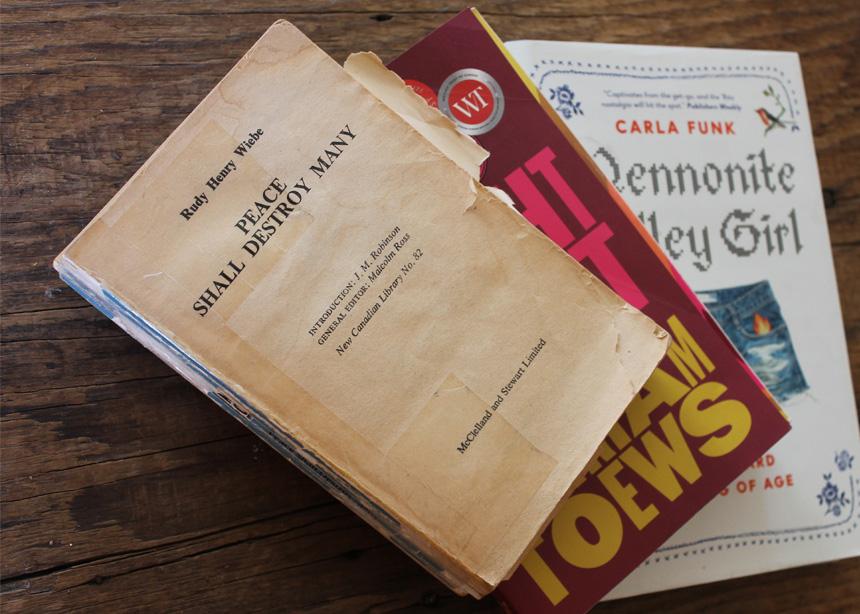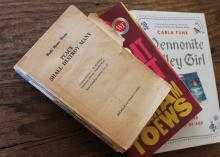A couple winters back, I read Peace Shall Destroy Many, Rudy Wiebe’s landmark 1962 novel, for the first time. And the second and third.
The story brims with drama, insisting that tensions be faced and latent conflicts in a remote Mennonite enclave be exposed. Peace demands rigour.
I hunger for that rigour of honesty. I fear it too, but the hunger is greater.
I love the way my teenage sons, like many youth, call out inconsistencies. They push me ethically and spiritually. Sometimes relentlessly. They compel me to Lenten self-denial and point out actions that do not align with me standing behind a pulpit.
They’re bruising, gentle and funny, in turn. Always searching.
They recognize the complexity of life and look it in the eye.
I see Wiebe’s novel—an excerpt of which appears on pages 14 to18 of the March 29, 2024 print issue of Canadian Mennonite—doing something similar, though I hesitate to compare teenage quips to a monumental work of literature.
Our church has an odd relationship with literature. While Mennonite writers have exhibited exceptional giftedness—Wiebe received two Governor General’s Awards—much of the value of their work is lost on the church.
Until my later 20s, I did not get literature. I’m a math lover raised in a utilitarian culture. I never took an English class after grade 12. I would have responded to a novel such as Wiebe’s by saying, “That’s unrealistic.”
It was the writing of Northrop Frye that jolted the right side of my brain to life. Frye, a Canadian Christian who died in 1991, was one of the most influential literary critics of the last century.
I started reading his work to better understand the Bible, but the effect was broader.
“The poet’s speech is . . . linked to something involuntary in the mind, and he can write in the hope that something less inhibited and with greater penetrating power may emerge,” he wrote in Words With Power: The Bible and Literature.
Novelists, like poets, do something different than theologians, preachers and historians. They open other doors, tap other realms.
Frye wrote: “As literature asserts nothing, but simply holds up symbols and illustrations, it calls for a suspension of judgement, as well as varieties of reaction, that, left to itself, could be more corrosive of ideologies than any rational skepticism.”
Wiebe does not say which of his characters we should agree with. We can enter the back and forth of the tension, bending, shifting, stretching and growing.
Maybe allowing story and poem to slowly work their magic—a term Frye invokes—is better than arguing a point.
Literature makes the mind and heart more agile.
This is not to discount other forms of expression—like editorials—but to commend the gift of literature, alongside other gifts of the Spirit, to the reluctant among us.
As Frye discusses, much of the Bible is clearly written in poetic and literary form—consider the Psalms, parables, Jonah—so we do well to open ourselves to these gifts.
Peace Shall Destroy Many can be received as a Spirited challenge to face inconsistencies in faith communities or it can be pushed aside as a flight of fancy. Or it can be welcomed as a great story offering a kaleidoscope of meaning.
It can also be seen as a case study in conflict. On page 20, long-time mediator Janet Schmidt imagines a hypothetical intervention in the conflict depicted in the Wiebe excerpt, and she talks more generally about how we might be able to avoid division by “doing conflict” well [see a version of the article here].
Emily Summach’s article on page 30 marks her final contribution as Saskatchewan correspondent, a role she has had since November 2021. For the last year she has doubled as Alberta correspondent as well.
As mentioned in the lovely feature she wrote for the last issue, Emily has accepted a full-time pastoral position at Mount Royal Mennonite Church in Saskatoon. We offer much gratitude for the diligence and warmth with which Emily has carried out her work, and we bless her in her next steps.






Add new comment
Canadian Mennonite invites comments and encourages constructive discussion about our content. Actual full names (first and last) are required. Comments are moderated and may be edited. They will not appear online until approved and will be posted during business hours. Some comments may be reproduced in print.